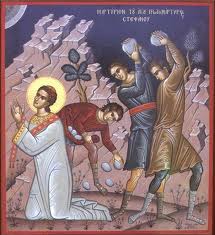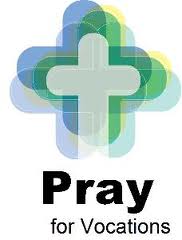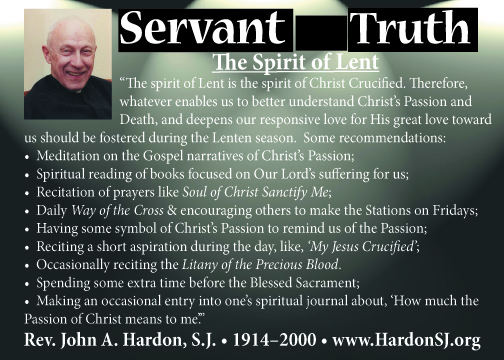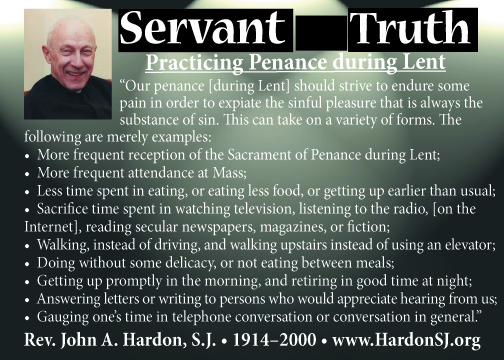Tag Archives: Fr. Hardon
Reparation for Sin During Lent
Practicing Penance During Lent
The Age of Martyrs
 Today we celebrate the feast of St. Stephen. Not only was he one of the first deacons in the Church (cf. Acts 6:1-6), but he’s also the first recorded post-Resurrection martyr for Christ.
Today we celebrate the feast of St. Stephen. Not only was he one of the first deacons in the Church (cf. Acts 6:1-6), but he’s also the first recorded post-Resurrection martyr for Christ.
Sometimes martyrdom may some far removed from our own comfortable existence. To counter such a mindset, we offer the following reflection from Servant of God John A. Hardon, the founder of the Institute on Religious Life, who tells us why the present age is truly the “age of the martyrs.” This is taken from a conference he gave on the Precious Blood of Christ.
We believe that by His death on the cross, Christ merited all the graces we need to reach heaven. He won all the graces necessary for our salvation. He gained all the graces that the human race needs to reach its eternal destiny.
But we also believe that what Christ did by dying for us on the cross requires that we die on our cross by cooperating with the graces that Jesus won for our redemption. He could not have been more clear. He told us, “If you wish to be my disciples, take up your cross and follow me.” We must cooperate with Christ’s grace if we wish to join Him in eternity. He was crucified by shedding His blood. We must be crucified by shedding our blood in witness to our love.
All of this is elementary Christian teaching. The Precious Blood of Christ does indeed provide us with the light and strength we need to reach heaven. But we have to do our part, otherwise Christ’s passion and death on Calvary would have been in vain.
The focus of our conference is on the Precious Blood of Christ in the age of martyrs. What are we saying? We are saying that the present century is the age of martyrs par excellence. Ours is THE (all three letters capitalized) age of martyrs.
No words of mine can do justice to this statement: We are inclined to think that martyrs are those ancient men and women in the first centuries of the Church whom we commemorate by name in the first Eucharistic Prayer, when we say, “We honor the apostles and martyrs,” and then name after the apostles, “Linus, Cletus, Clement, Sixtus, Carnelius, Cyprian, Lawrence, Chrysogonus, John and Paul, Cosmas and Damian.”
Unless we take stock of ourselves, martyrs are not commonly associated with the later history of the Church, and certainly not with our own times. What a miscalculation!
A conservative estimate places the total number of martyrs who died for Christ up to the liberation edict of Constantine in 313 A.D. at around 100,000. We call that period of massive persecution the age of martyrs. Yet, the number of Christians who have died for their faith since 1900 is several million. In the Sudan alone, during the 1950s, over two million Catholics were starved to death by the Muslims because they refused to deny that Mary is the Mother of God since her Son is the Ibn Allah, the Son of God. There have been more Christian martyrs since the turn of the present century than in all of the preceding centuries from Calvary to 1900 put together.
It is no wonder that the Second Vatican Council in its Constitution on the Church went out of its way to identify martyrdom as one of the marks of holiness in our day. The passage deserves to be quoted in full: Continue reading The Age of Martyrs
How Do I Know?
 Last week the editors of the National Catholic Register offered the following response to the question, “How do I know what my vocation is?” In doing so, they quote Servant of God John A. Hardon, the beloved founder of the Institute on Religious Life.
Last week the editors of the National Catholic Register offered the following response to the question, “How do I know what my vocation is?” In doing so, they quote Servant of God John A. Hardon, the beloved founder of the Institute on Religious Life.
“A religious vocation is a special grace that God gives to certain persons, calling them to a life of the evangelical counsels,” wrote Jesuit Father John Hardon, whose canonization cause is under way, as chronicled at EWTN.com. “What are some typical features of a true vocation to the religious life? I would emphasize especially three: 1) a strong faith in the Catholic Church and her teaching, shown by a firm loyalty to the Vicar of Christ; 2) a love of prayer, at least the capacity for developing a desire for prayer; and 3) a readiness to give oneself to a life of sacrifice in the footsteps of Jesus Christ. . . . I believe that if every prospective candidate were to make a private retreat, even for a few days, under a competent priest, it would help immensely. The retreat could be especially geared to a person who thinks that he or she has a vocation to the religious life. Then, during the retreat, in an atmosphere of silence and prayer, ask God to enlighten one’s mind as to whether or not he is calling the person to a life of Christian perfection. This, in fact, is one of the original purposes of the Spiritual Exercises of St. Ignatius: to discover and decide on one’s state of life.” Continue reading How Do I Know?
What Is a Religious Vocation?

Servant of God Fr. John A. Hardon, S.J., the founder of the Institute on Religious Life, summarized it this way:
“A religious vocation is a special grace that God gives to certain persons, calling them to a life of the evangelical counsels.”
While he stressed the fact that vocations are a special grace or gift from God, Fr. Hardon pointed out three typical features of a vocation to the religious life: (a) a strong faith in the Catholic Church and her teaching, shown by a firm loyalty to the Vicar of Christ; (b) a love of prayer, or at least the capacity for developing a desire for prayer; and (c) a readiness to give oneself to a life of sacrifice in the footsteps of Jesus Christ.
For the full text of Fr. Hardon’s insights on this subject, click here. And be sure to check out other of his meditations that are archived at the IRL site.
Sacrifice and Vocations

With Lent only a week away, I thought readers might be interested in “Sacrifice and Vocations,” a reflection by Fr. John A. Hardon, S.J., the late founder of the IRL.
In this reflection, Fr. Hardon notes that instilling in our children a spirit of sacrifice goes hand in hand with fostering vocations. He says that God “generally calls those persons to follow Him as priests or religious, who have been taught the value of sacrifice from childhood.”
He further explains:
“The experience of self-denial in the use and enjoyment of material things is the normal predisposition for a lifetime practice of evangelical poverty. Training in self-control of the senses, especially in the use of the media, is the ordinary preparation for a lifelong dedication to consecrated chastity. Careful and loving nurture in self-denial, almost from infancy, is God’s usual way of conditioning the human will for commitment to the counsel of obedience.”
Click here for access to a dozen of Fr. Hardon’s beautiful reflections on religious and priestly vocations.


